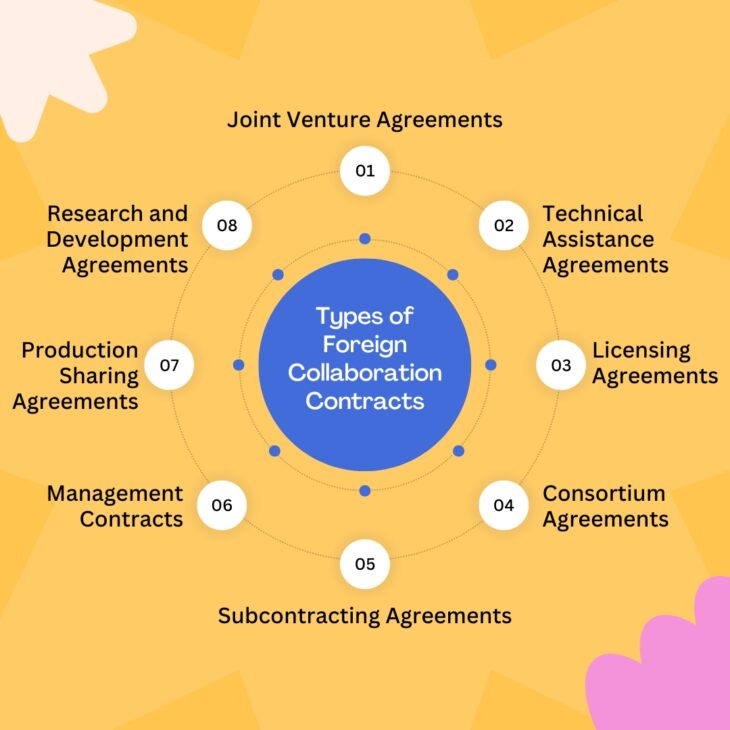Introduction
Foreign Collaboration is one of the most effective strategies that businesses and nations can use to realize common goals. It enables companies from various countries to pool their funds, skills, and opportunities to attain objectives that may be unattainable when operating individually. Thus, this article aims to describe what foreign collaboration is, the types of activity that can be realized within the framework of cooperation, and the benefits and potential problems of this activity. We will also talk about the significance of communication and governmental rules in foreign partnerships.
Foreign Collaboration

Every country seeks foreign capital or investment to fuel its development. There are different forms of foreign capital or investment. One form is foreign collaboration. Similarly, when a company does not have the necessary technical know-how in a particular line of business, it needs to go for the acquisition of technical know-how from outside.
The project report must elaborate on the possible sources of collaboration and the choice of any specific source. In this connection, a company may either:
- Opt for outright purchase of proposed technology, if supplier/manufacturer so agrees,
- Agree with the supplier of technology who agrees to technical and financial participation in the proposed venture.
Meaning of Foreign Collaboration
Foreign collaboration means an agreement between two or more companies from different countries to carry some business operations. Resident and non-resident entities ally to work together on a specific task.
Thus, foreign collaboration is a strategic alliance (or cooperation)between one or more resident and non-residential entities. Foreign companies from different countries enter into agreements or contracts to collaborate for mutual benefit.
These collaborations fall into four main types: technical, marketing, financial, and consultancy. Before the initiation of foreign collaboration, it requires approval from the government of a domestic country.
The collaborating entities draft a preliminary agreement as part of the approval process. After seeking govt’s permission, the resident and non-resident entities sign the preliminary agreement, and a contract is executed to form a foreign collaboration.
Once the foreign collaboration is established, the resident and non-resident entities launch their business together in the domestic country. Collaborating entities share their profits according to the profit-sharing ratio mentioned in their executed contract. Tenure (term) is specified in the written contract.
You can refer to Foreign Collaboration: Finance Management Marketing on Scribd.
Common Challenges of Foreign Collaboration

The concept of foreign collaboration comes with huge advantages, but establishing how to work with different cultures may not be very easy.
Here’s how to tackle the most common challenges:
- Understand and respect: Proactively try to gain as much knowledge as possible about your view of your partners’ cultural taboos, ways of communication, and working patterns.
- Bridge the gap: To avoid misconceptions, one should address the issue and share his/her point of view with the other person searching for a compromise.
- Coordinate across time zones: Schedule your meetings and deadlines in a way that allows all the members to attend.
- Maximize availability: Be as adaptive as you can and try to look for real-time overlapping windows.
- Effective communication is key: Though English might not be the native language for everyone, it is appropriate to ensure that all the language used is very simple and to the point to eliminate horrific misunderstandings.
- Double-check everything: Take time to Go over all the communication to ascertain that all the different audiences receive the message.
- Navigate the legal landscape: Get acquainted with all the legislation and legal standards of the countries you are working in or plan to work with.
- Protect your work: Something that should also not be omitted is the issue of intellectual property rights and the clarification of contracts about more issues that may lead to future disputes.
- Focuses efforts: This way, people are motivated towards meeting the same goals and nobody is wasting the time and energy of the organization.
- Boosts collaboration: Mutual goals provide unity of the purpose with a consequent focus on collaboration and communication.
- Increases accountability: When every one of the staff understands the big picture, then he or she is more committed to contributing expressly on how his or her contribution will help in delivering that goal.
- Motivates and inspires: Clarity of goals is very essential since it offers direction and satisfaction hence making people work harder in an organization.
- Improves decision-making: Organizations ensure that under this guidepost, the different teams have a common aim to guide the choices they make for the progress of the overall picture.
Effective Communication Channels

Let’s explore how we can actively improve communication by choosing the right channels:
- Face-to-Face Meetings: Thus, we could arrange for face-to-face communication to facilitate good relations and to ensure that nothing is misunderstood.
- Emails: Regarding the form of interaction, we can use written messages, for instance, brief and informative emails for applying the asynchronous communication pattern when sharing updates and keeping records.
- Instant Messaging: It will help us to use the chat platforms for asking quick questions, using it in real-time teamwork, and helping the team stay updated all the time.
- Project Management Tools: We can use all these to help us assign work, track results, and share files among the team.
Examples of Foreign Collaboration
| Industry | Collaboration | Description |
| Tech and Fashion | Adidas & Lego | Launching shoes inspired by Lego designs |
| Healthcare and Retail | CVS & Uber | Delivering prescriptions directly to customers through Uber |
| Entertainment and Finance | American Express & Marvel | Launching a Marvel-themed credit card |
| Food and Tech | Domino’s & Self-driving Car Companies | Implementing autonomous pizza delivery |
| Sustainability Champs | Biotherm & Renault | Developing a “Spa Car” focusing on wellness and relaxation |
Benefits of Foreign Collaboration
Managing relations with foreign partners causes the lever of opportunities for companies, universities, and sometimes even countries to open.
Here are some benefits::
- Shared Expertise: People from different backgrounds come together through collaboration. The sharing of ideas creates new solutions to new problems on a completely different altogether different level.
- Tech Transfer & Acceleration: This can enable foreign partners to develop and implement new technologies and new processes in developing countries, thus keeping the companies relevant.
- Global Market Access: Sourcing relationships help create opportunities for new foreign markets to be tapped, thereby increasing the business clientèle globally.
- Cross-Cultural Understanding: International collaborations constitute a component of the development of cultural sensitivity and awareness. These can result in better communication and efficient cooperation in the following work process.
- Research & Development: They combine funding and research activities, and address problems that one nation often cannot overcome independently.
- Economic Growth: Over the years international cooperation can be instrumental in creating employment opportunities as well as establishing sources of foreign investment for any country that is part of the agreement.
Government Regulations in Foreign Collaboration
Regulations are an important tool that governments throughout the world have at their disposal to influence foreign collaborations and partnerships.
Here’s a breakdown of how three key areas influence these deals:
- Intellectual Property (IP) Concerns: Those countries that have more serious laws on the protection of intellectual property rights may demand more elaborate specifications in the contracts on cooperation. They might prescribe how the ownership of any new inventions or discoveries that come out of the research partnership will be resolved. This can be a source of conflict especially where the partners’ contribution varies towards the R & D tasks.
- Data Privacy Laws: They also said that restrictions such as data privacy laws including the European Union General Data Protection Regulation (GDPR) help to limit interactions. Such regulations may limit the transfer of data across borders which may make the company devise circuitous means of handling data in a manner that will be consistent with the laws of both countries.
- Restrictions on Foreign Ownership: Due to the theoretical background some governments may regulate the amount and how international investment can be made in specific industries such as defense and or infrastructure. This can almost make it impossible for foreign firms to invest in joint ventures or to acquire firms in the local market. Reduced ownership ratios might require the arrangements for the collaboration to be made in such a manner to be consistent with these limitations.
Types of Foreign Collaboration Contracts

- Joint Venture Agreements: These agreements create a new legal person who is jointly owned by the parties to the agreements.
- Technical Assistance Agreements: This is a special arrangement whereby a firm gives services, products, or knowledge to another firm for a particular task.
- Licensing Agreements: One party receives consideration from another party to allow the use of its proprietary assets which are items like patents and trademarks.
- Consortium Agreements: It is a phenomenon whereby different stakeholders collaborate to gather financial and other forms of support as well as skills to complete a particular project.
- Subcontracting Agreements: Special arrangements where one party contracts another party to undertake a particular segment of work in a more extensive project.
- Management Contracts: It is an agreement where one party engages another party to undertake certain tasks or contracts for the management of the business of the first party in a foreign country.
- Production Sharing Agreements: Joint ventures involve a legal agreement between two or more parties to split equally the costs and revenues that are likely to be incurred or generated in the exploration of a resource (such as oil).
- Research and Development Agreements: It provides that the parties may enter into research and development activities and that such activities may be carried out under joint ownership of the resulting intellectual property.
Conclusion
International cooperation is a vast area with great potential for trade, education, and even nations as a whole. Through the promotion of knowledge exchange, development of technology, and global markets, foreign collaborations promote economic development, technology, and international understanding. However, legal environment and cultural barriers are some of the essential factors that need to be addressed in foreign partnerships.
Kindly use the comment section and share this article if you find it useful.










Leave a Review